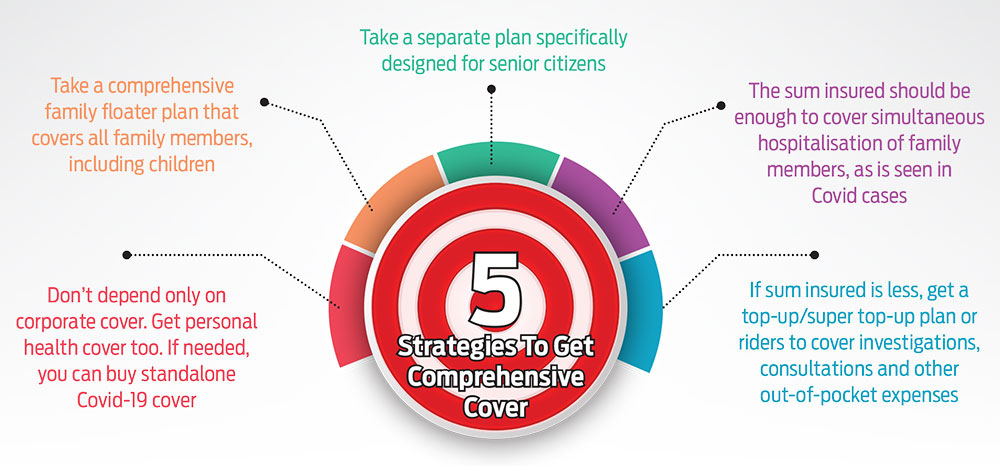Health Cover Checklist
If the answer is ‘yes’ to all these questions, you are doing the right thing. If there is a ‘no’, make sure you take steps to change that
- Are all your family members covered?
- Is the sum insured adequate for all your family members?
- Have you reviewed your family floater plan, co-payment and sub-limits?
- Does your policy cover hospitalisation expenses due to infectious diseases (Covid and future infections)?
- If your sum insured falls short, have you taken a super top-up or top-up plan?
***
The new variant of Covid-19, Omicron, is being touted as less severe, but a lot of uncertainty remains about which strain will come next and how deadly it may prove to be. Moreover, the Omicron (B.1.1.529) variant has a large number of mutations, which suggests that there could be an increased risk of reinfection even among the vaccinated. Apart from masking up and taking adequate precautions, health insurance is something you can’t ignore in such a scenario. If you have an existing health insurance policy, check it thoroughly to ensure that you will be covered in case of any eventuality.
The good news is that most existing health insurance policies cover even the new Covid variants. “Existing health indemnity policies cover you for hospitalisation expenses due to infectious diseases and, hence, Covid-19, irrespective of the variant, is covered. Standalone Covid-19 policies will also cover this new variant as the base of the policy—Covid-19—stays the same,” says Gurdeep Singh Batra, head-retail underwriting, Bajaj Allianz General Insurance. Recently, the Insurance Regulatory and Development Authority of India (Irdai) also clarified that all health insurance policies will cover Omicron.
Here are some key questions to ask yourself to ensure that your health insurance policy and the sum insured is Omicron-ready.
Should I Review My Health Insurance Plan?
It’s important to review your health insurance plan to check for any shortcomings. “While there has been a significant increase in awareness and demand for health insurance since the Covid outbreak, simply having insurance is not enough. This could be the ideal time to re-evaluate it,” says Amit Chhabra, head, health and travel insurance, Policybazaar.com, an insurance aggregator.
To start with, review the sum assured. “It is better for a family of four members to have a cover of at least `10 lakh. If your existing policy is below this value, you must seriously consider increasing it to avoid major erosion in your savings,” says Chenthil Iyer, founder and chief strategist, Horus Financial Consultants, which also trains aspiring financial planners.
Dive deeper into the policy and review the co-payment and sub-limits as the former determines the share of the hospital bill the policyholder will need to pay, and the latter determines monetary caps such as on hospital room rent. Both these play a role in the policyholder’s out-of-pocket expense.
When you review your policy, do so with the purpose of analysing the risk of diseases and medical expenses associated with them. “Covid can infect all the family members together, (and so) the policyholder must calculate the expenses with regard to the entire family,” says Naval Goel, founder and CEO, PolicyX.com, an insurance comparison portal.
You need a plan that covers the majority of diseases. “The second wave is still a terrifying reminder of how important it is to plan ahead of time. During this time, medical bills rose to `85 lakh-1 crore. If you have an insufficient sum insured, you will have to pay the difference,” says Chhabra.
Should I Consider Top-Up Plans To Increase Sum Insured?
As healthcare costs are on a constant rise, planning financial resources towards unanticipated medical expenses is imperative. Super top-up and top-up insurance plans help you do this. These plans let customers choose specific deductible amounts or limits that they will have to bear before the insurance policy starts paying out at the time of claim. This limit is called ‘aggregate deductible’ in insurance parlance and a customer can opt for the figure depending on the maximum coverage of his or her basic health insurance policy or the expense one may extract from one’s own income.
Top-up and super top-up plans have many similarities but a major difference is that while a top-up plan covers a single hospitalisation claim above the deductible amount during the policy period, a super top-up plan covers multiple claims above the deductible amount during the policy period depending on the sum insured.
Opt for a super top-up plan if you feel a sufficient base health insurance is already available but the coverage in terms of sum insured needs to be enhanced at an affordable premium. “I believe that one must have a base health indemnity policy with a sum assured of at least `10 lakh with a super top-up cover of `20 lakh-plus. A super top-up helps you enhance your coverage if your base policy sum insured gets exhausted, and that too at economical premium rates,” says Batra.

Should I Go For Additional Riders With The Policy?
You have the flexibility to buy riders to enhance health insurance coverage based on specific requirements.
While comprehensive policies cover the treatment of Covid infections, including Omicron, health insurance companies have introduced riders that also cover consumable items such as PPE kits, gloves, masks, and other items that are generally not covered.
“Riders are optional benefits that can be added to your policy at an additional cost to your premium. Some of these riders may be useful during the Covid period. Consumables, for example, account for 20 per cent of Covid hospitalisation bills, but many comprehensive plans do not cover them by default. Similarly, critical illness insurance helps pay your bills in the event of a serious illness caused by Covid, such as a heart attack or kidney failure. A few other riders, such as a hospital cash benefit or inflation protection rider can also be beneficial during these times,” says Chhabra.
Some health insurance companies offer features such as coverage for home quarantine, either as an in-built feature or as an add-on rider. Tata AIG MediCare, for example, covers consumables as an in-built feature, while Niva Bupa offers a Safeguard rider for the same. Care Health Insurance offers Care Shield rider that covers gloves, masks, braces, belts, spirometer and other consumables in case of hospitalisation.
“Considering that non-medical expenses, which are a part of hospitalisation bills, are a cause of concern, we have introduced a non-medical expenses rider. Recently, we also introduced ‘Health Prime’ rider, which comes with our company’s health insurance and personal accident policies,” says Batra. This rider has four covers—teleconsultation, doctor consultation, investigations and annual preventive health check-up, he adds.
“Also, check if other expenses like doctor consultations, tests, the use of medical aid items and ambulance charges, are covered,” says Chhabra.
Remember that, typically, these riders are not available during renewal. To take advantage of these riders, one has to buy a new health policy or change to another policy.
How Do I Ensure That My Children Are Covered?
If you have young children, taking a family floater health insurance plan is advisable. They are the best option for families that do not have a significant history of chronic issues.
However, ensure that your floater policy is large enough to cover the entire family, including even the youngest children. “This is an important time for parents to review their child’s health insurance coverage and better understand his or her family’s and future needs,” says Subramanyam Brahmajosyula, head, reinsurance and product development, SBI General Insurance.
For older children, you may consider a separate individual health insurance plan. “It is best to invest in a suitable health insurance plan at a relatively young age so that the cost of health insurance premium is low. Thus, it’s strongly recommended to make a timely investment for a child’s health insurance,” adds Brahmajosyula.
Should I Buy A Separate Policy For My Parents?
Senior citizens, especially who have co-morbidities, are vulnerable in these times. A separate, comprehensive health cover is suitable for senior citizens as they need wider coverage.
Senior citizens, typically, have medical conditions that require regular treatment or assistance, which may not be the case for other family members. “Therefore, it is always recommended that parents are covered under a separate plan specifically designed for senior citizens. Such plans provide conditions and facilities that are best suited for them,” says Goel.
Moreover, the premiums increase with age and with higher incidence of pre-existing diseases. So, health insurance plans for senior citizens may be more expensive than for other family members.
When reviewing your health plan, think of future situations as well; for instance, there may be new variants after Omicron. Hence, it’s important to have a comprehensive cover. Hope for the best and plan for the worst.
meghna@outlookindia.com










